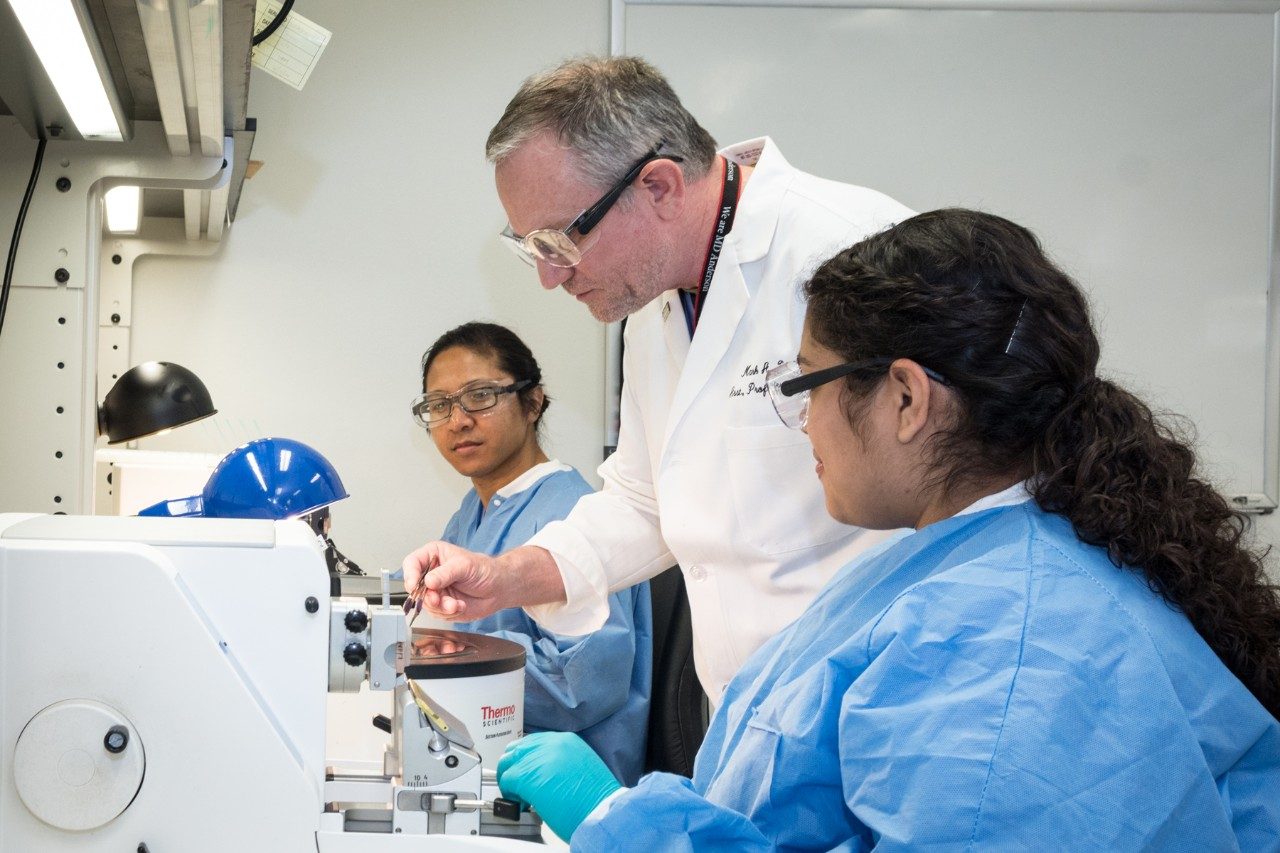Histotechnology
in the School of Health Professions
Log in to our secure, personalized website to manage your care (formerly myMDAnderson).
If you are ready to make an appointment, select a button on the right. If you have questions about MD Anderson’s appointment process, our information page may be the best place to start.
Appointment Informationin the School of Health Professions
View the 2025 Histotechnology Virtual Brochure (pdf).
The Histotechnology program prepares students for a challenging and exciting career as a histologic technologist.
The program annually admits 16-20 new students in three tracks leading to the Bachelor of Science degree:
This baccalaureate program consists of lectures, demonstrations, and rotations through various hospital histopathology laboratories that provide experience in routine and specialized procedures. The program maintains an extensive collection of microscope and projection slides for use with lectures and independent studies.

Instructor reviewing tissue on slides

Students embedding tissue specimen

Instructor assisting students with microtomy

Student filing slides for later review

Student performing crytomy on tissue

Instructor grossing tissue

Student performing the staining process
Program Director
Mark A. Bailey, M.A.
Associate Program Director
Toysha Mayer, D.H.Sc.
Executive Advisor
Maria Gubbiotti, M.D., Ph.D.
Assistant Professor, Department of Pathology
Division of Pathology and Laboratory Medicine
The Histotechnology program is accredited by and has conformed its curriculum to the standards published and monitored by the:
National Accrediting Agency for Clinical Laboratory Sciences (NAACLS)
5600 N. River Rd., Ste. 720
Rosemont, IL 60018-5119
Phone 773-714-8880
Fax 773-714-8886
Upon graduation, students are eligible to take the Board of Certification (BOC) exam offered by the American Society of Clinical Pathology (ASCP).
The program has developed affiliations with reference labs and medical institutions in Texas, so that students will develop expertise in a variety of settings and experience the breadth of opportunity available to a certified histotechnologist. During the clinical phase of instruction, training and supervision are provided in affiliated hospitals and clinical laboratories.
LABORATORY INTERNSHIP PLACEMENT POLICY
Purpose
The purpose of this policy is to outline the process by which a student enrolled in the Histotechnology Program is informed and affected by a laboratory internship rotation cancellation.
Policy Statement
It is the policy of The University of Texas MD Anderson Cancer Center School of Health Professions Program in Histotechnology to limit student enrollment to that of available laboratory internship rotations. In case of an internship rotation site cancellation, affected student/s must be informed within 5 school days of the cancellation. Student placement in the remaining laboratory internship rotation will be picked up by one of the MD Anderson rotation sites; or an equitable experience will be offered in the program’s student laboratory; or by other Houston sites to ensure their clinical education will not be interrupted.
STUDENT INTERNSHIP WORK POLICY
Students at the MD Anderson School of Health Professions Program in Histotechnology are required to perform regular service work in histopathology laboratories as a part of their internship education. This allows students to become competent with histologic techniques and prepares them to enter the workforce with the necessary entry-level competencies to function in any routine histopathology laboratory. All laboratory service work performed by students will be monitored by the assigned preceptor in each laboratory.
THE USE OF STUDENTS IN PLACE OF QUALIFIED HISTOTECHNOLOGY STAFF IS STRICTLY PROHIBITED.
Note: If the student must be left alone in any laboratory area for an extended period, please notify the Program Director to ensure proper supervision of the student. Students are also exempt from the “on call” rotation and other laboratory experiences outside of the regular working hours.
As a specialty in the clinical laboratory sciences profession, histotechnology comprises the application of theory and applied knowledge in preparing and testing surgical and biopsied tissue specimens for microscopic examination by pathologists.
The rapid growth of this specialty offers numerous opportunities inclusive of receiving a comprehensive education in entry level routine and special histotechniques, laboratory operations, immunohistochemistry, biopsy grossing and digital imaging. Upon completion of the program, a Bachelor of Science in Histotechnology degree is conferred and eligibility requirements are satisfied to take the American Society of Pathology (ASCP) Board of Certification HTL examination affording opportunities to advance a career in the following laboratory services.
Scientists of Histotechnology receiving a comprehensive technical, administrative and leadership education will advance their career path beginning as a clinical service bench histotechnologist and advance, if qualified and ambitious, to become a lead histotechnologist, supervisor, lab manager, lab informatics manager, educator and administrator.
In addition, MD Anderson’s Department of Human Resources conducted an analysis of state and local compensation reporting the salary range is $63,000 to $98,000 for a B.S., HTL(ASCP)CM clinical histotechnologist.
| Year | Graduation Rate | Placement Rate^ | Pass Rate* |
|---|---|---|---|
| 2011 | 100% | 88% | 88% |
| 2012 | 100% | 80% | 90% |
| 2013 | 100% | 100% | 73% |
| 2014 | 100% | 100% | 90% |
| 2015 | 100% | 93% | 92% |
| 2016 | 100% | 87% | 100% |
| 2017 | 100% | 100% | 80% |
| 2018 | 94% | 94% | 88% |
| 2019 | 100% | 100% | 94% |
| 2020 | 100% | 93% | 100% |
| 2021 | 90% | 93% | 90% |
| 2022 | 100% | 100% | 93% |
| 2023 | 100% | 88% | 88% |
| 2024 | 93% | 93% | 93% |
| 2025 | 100% | 100% | 93% |
^ Indicates employed or pursued additional education.
* The NAACLS certification exam benchmark standard for accredited programs is three years of consecutive results demonstrating an average of at least a 75% pass rate on the ASCP-BOC examinations, for students within the first year of graduation as calculated from the most recent three-year period. (NAACLS Standard II. B. 1.).
Mark Bailey
713-794-5877
MABailey@mdanderson.org
School of Health Professions
713-745-1205
askSHP@mdanderson.org
Learn more about our faculty and research taking place in our labs.
View conferences available for continuing education credit.
